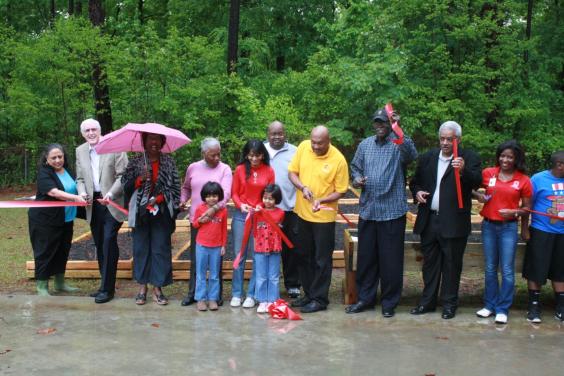Atlanta Places of Worship Grow Gardens in their Yards

Nazeera Dawood, former health promotion manager of Georgia’s Fulton County Department of Health and Wellness in Atlanta, is passionate about her work. When the county’s interfaith coalition invited her to speak about health, she eagerly showered them with “BMIs and other numbers.”
“I don’t know what you’re talking about…” members told her.
Dawood then asked for their views. They told her they considered the body a temple. “We want to eat fresh fruit and vegetables,” coalition members said.
This conversation started an interfaith effort to establish community gardens at congregations around the county. When the Georgia Department of Public Health saw Fulton County’s coalition “growing and blooming,” they were excited to offer seed funds to help start the gardens.
Now Muslim, Baha’i, Buddhist and Christian places of worship all have community gardens in their backyards. The coalition offers wellness resources for congregations, including breastfeeding policies, nutrition guidelines for gatherings, and tips to encourage physical activity. Congregants are gardening, learning how to prepare produce, shopping at farm-to-congregation markets, participating in physical activity breaks during or after worship, and more. As the interfaith coalition has expanded its work in Fulton County, its focus has grown to include policy goals and plans to develop a youth leadership program.
Dawood feels the coalition succeeded where others struggle because she responded to their interests rather than dictating what they should do. “Get buy-in and listen to the community,” she advises.
Some won’t want to be involved with the government, Dawood warns, so government officials should not wait and expect residents to approach them. Instead, she believes governments must empower people with the tools and resources to make health happen in their own communities.
The interfaith coalition is now facilitated through the Office of the Chairman in Fulton County. To reach Nazeera Dawood, Chief of Staff, email [email protected].
Communities in Action provide examples of strategies or tools in action. Their purpose is to connect like-minded communities in their implementation efforts, giving insight into how others are tackling key challenges and what they've accomplished. To learn more about the evidence supporting this strategy's effectiveness or resources to help move towards implementation, see the What Works for Health summary of Community gardens.
Date added: March 26, 2014
Date last updated: June 28, 2017
